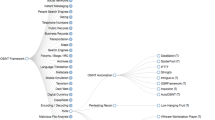
Overview
- Includes research results with important implications for law enforcement agencies and intelligence services
- Provides graduate students with the fundamental research problems of the social media and open source intelligence field
- Introduces real-world datasets and presents recent trends in this active research area
Part of the book series: Lecture Notes in Social Networks (LNSN)
Buy print copy
About this book
This book shows how open source intelligence can be a powerful tool for combating crime by linking local and global patterns to help understand how criminal activities are connected. Readers will encounter the latest advances in cutting-edge data mining, machine learning and predictive analytics combined with natural language processing and social network analysis to detect, disrupt, and neutralize cyber and physical threats. Chapters contain state-of-the-art social media analytics and open source intelligence research trends. This multidisciplinary volume will appeal to students, researchers, and professionals working in the fields of open source intelligence, cyber crime and social network analytics.
Chapter Automated Text Analysis for Intelligence Purposes: A Psychological Operations Case Study is available open access under a Creative Commons Attribution 4.0 International License via springerlink.bibliotecabuap.elogim.com.
Similar content being viewed by others
Keywords
Table of contents (9 chapters)
-
Front Matter
Editors and Affiliations
Bibliographic Information
Book Title: Open Source Intelligence and Cyber Crime
Book Subtitle: Social Media Analytics
Editors: Mohammad A. Tayebi, Uwe Glässer, David B. Skillicorn
Series Title: Lecture Notes in Social Networks
DOI: https://doi.org/10.1007/978-3-030-41251-7
Publisher: Springer Cham
eBook Packages: Computer Science, Computer Science (R0)
Copyright Information: Springer Nature Switzerland AG 2020
Hardcover ISBN: 978-3-030-41250-0Published: 01 August 2020
Softcover ISBN: 978-3-030-41253-1Published: 02 August 2021
eBook ISBN: 978-3-030-41251-7Published: 31 July 2020
Series ISSN: 2190-5428
Series E-ISSN: 2190-5436
Edition Number: 1
Number of Pages: V, 251
Number of Illustrations: 19 b/w illustrations, 69 illustrations in colour
Topics: Systems and Data Security, Computational Intelligence, Data-driven Science, Modeling and Theory Building, Cybercrime, Data Mining and Knowledge Discovery, Machine Learning



